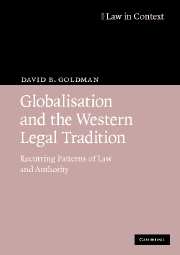Book contents
- Frontmatter
- Contents
- Preface
- 1 Introduction
- Part 1 Towards a Globalist Jurisprudence
- Part 2 A Holy Roman Empire
- Part 3 State Formation and Reformation
- Part 4 A Wholly Mammon Empire?
- Part 5 Competing Jurisdictions Case Studies
- 11 The twenty-first century European community
- 12 International commercial law and private governance
- 13 Conclusion: what is to be done?
- Bibliography
- Index
11 - The twenty-first century European community
Published online by Cambridge University Press: 30 March 2010
- Frontmatter
- Contents
- Preface
- 1 Introduction
- Part 1 Towards a Globalist Jurisprudence
- Part 2 A Holy Roman Empire
- Part 3 State Formation and Reformation
- Part 4 A Wholly Mammon Empire?
- Part 5 Competing Jurisdictions Case Studies
- 11 The twenty-first century European community
- 12 International commercial law and private governance
- 13 Conclusion: what is to be done?
- Bibliography
- Index
Summary
A foreigner stands with trepidation at the foot of the volcano of European Union (EU) literature. This volcano regularly erupts and seems to bury so much of what has come before. Some specific purposes warrant and delimit the present case study. A general, globalist jurisprudence must search for the constitutional vocabulary to attempt to understand and foster interactions amongst the various societies comprising the global scene, including civic and international organisations, nation-states and their peoples. This a globalist jurisprudence must seek to do with sensitive deference to a prominent tension of globalisation which has characterised the Western legal tradition: the espousal of universal norms and ‘one-size-fits-all’ law versus the different norms and laws of particular communities. Some other familiar themes will be advanced too. The regional constitutional construct of the EU proves that law need not be thought to come only from the state, showing a continuity in the West of a legal tradition characterised by competing jurisdictions. Furthermore, the kinship elements of the nation and the comradeship elements of the state are interacting with the fulfilling Kantian prophecy of peace through trade in the creation of new authority.
These developments all take place nowadays amidst some ‘benign neglect’ of the troubling yet hopeful historical context of Europe. For all of the economic theory which appears to be the raison d'être of the EU in the minds of so many, the proper place of economics must be recalled. According to J. H. H. Weiler, ‘Europe began as a political project par excellence served by economic instruments.’
- Type
- Chapter
- Information
- Globalisation and the Western Legal TraditionRecurring Patterns of Law and Authority, pp. 255 - 273Publisher: Cambridge University PressPrint publication year: 2008



